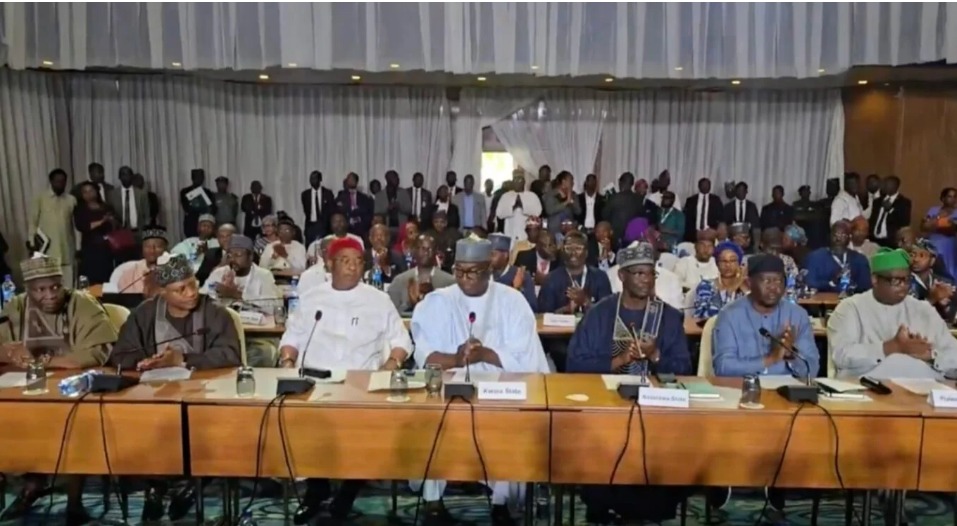Nigeria’s Governors Endorse Tax Reforms, Propose New VAT Sharing Formula
The Nigeria Governors’ Forum (NGF) has expressed its support for the tax reform bills presented to the National Assembly by President Bola Tinubu. This endorsement signifies a crucial step towards modernizing Nigeria’s tax system and enhancing its fiscal stability. The governors, after a meeting with the Chairman of the Presidential Fiscal Policy and Tax Reforms Committee, Taiwo Oyedele, issued a communique outlining their position on the proposed reforms. Central to their endorsement is a proposed revised Value Added Tax (VAT) sharing formula aimed at a more equitable distribution of resources among the states. This formula proposes a distribution based on 50% equality, 30% derivation, and 20% population, marking a significant shift from the current allocation mechanism. This development has far-reaching implications for the nation’s fiscal landscape and the distribution of resources among its federating units.
The proposed VAT sharing formula reflects the governors’ commitment to a more balanced allocation of resources. The 50% allocation based on equality aims to provide a baseline level of funding for all states, regardless of their economic output or population size. This acknowledges the inherent disparities among states and seeks to provide a foundation for essential services in all regions. The 30% allocation based on derivation recognizes the principle of resource ownership and allocates a significant portion of VAT revenue to the states where the value is generated. This incentivizes states to promote economic activities within their borders and ensures that resource-rich states benefit directly from their contributions. The remaining 20% allocation based on population acknowledges the varying needs of states with larger populations and provides them with additional resources to address the demands of their citizens.
Beyond the VAT sharing formula, the governors also addressed other crucial aspects of the tax reforms. They advocated for maintaining the current VAT rate and Corporate Income Tax (CIT) rate to ensure economic stability and avoid undue burdens on businesses and individuals. Furthermore, they emphasized the importance of continuing to exempt essential goods and agricultural produce from VAT to protect vulnerable populations and stimulate agricultural production. This focus on protecting essential sectors underscores the governors’ commitment to balancing fiscal responsibility with social welfare considerations.
The governors’ support for the continuation of the legislative process in the National Assembly demonstrates their commitment to seeing these reforms enacted into law. They reiterated their support for modernizing Nigeria’s tax laws and aligning them with global best practices. Their engagement with the Presidential Fiscal Policy and Tax Reforms Committee highlights the collaborative approach being taken to address this complex issue. The governors’ endorsement of the tax reform bills represents a significant step forward in the effort to modernize Nigeria’s tax system. Their proposed VAT sharing formula, combined with their other recommendations, aims to create a more equitable and efficient fiscal system that supports sustainable economic growth and development.
The context of these tax reforms lies in President Tinubu’s commitment to overhauling Nigeria’s fiscal framework. The President, recognizing the need for a more robust and efficient tax system, established the Presidential Committee on Fiscal and Tax Reforms to review existing tax laws and propose necessary changes. The committee’s recommendations culminated in four tax reform bills being submitted to the National Assembly for consideration. These bills encompass various aspects of the tax system, including the overall fiscal framework, tax administration, the establishment of a new revenue service, and the creation of a tax tribunal and ombudsman. The governors’ endorsement of these bills signifies a broad consensus on the need for these reforms and their potential to transform Nigeria’s fiscal landscape.
The significance of these tax reforms extends beyond revenue generation. They represent a fundamental shift towards a more transparent, efficient, and equitable tax system. By modernizing tax laws, streamlining administration, and addressing the distribution of resources, these reforms aim to create a more predictable and stable fiscal environment that fosters investor confidence and promotes economic growth. The proposed reforms also signal a move towards greater accountability and transparency in tax administration. The establishment of a tax tribunal and ombudsman aims to provide mechanisms for resolving tax disputes and addressing grievances efficiently and fairly, thereby strengthening the rule of law and enhancing public trust in the tax system. Overall, these reforms represent a critical step towards building a more robust and sustainable fiscal framework for Nigeria.














